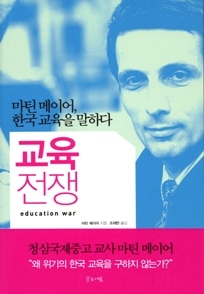![]()
The Words of the Meijer Family
|
|
The Words of the Meijer Family |

Dr. Maarten Meijer, UTS 1991, just had his latest book, Education War, published by Coliseum Publishers, in Seoul, Korea. In the book Maarten explains how the current crisis in Korean education can be solved and a new, principled, and successful paradigm for education can be implemented. Korea's largest newspaper, the Chosun Ilbo (Chosun Daily) and a number of other Korean media have covered the book.
Dr. Meijer graduated from UTS in 1991 and got his doctorate in Russian literature from Moscow State University in 2000. Right after, he and his family moved to Korea. He is teaching world religions at Chungshim International Academy, a middle and high school.
The following are a few excerpts from the book's introduction:
"In few countries do educational discussions reach such a feverish pitch as in Korea. Most people seem to agree on just one thing: The present approach to education in Korea is dysfunctional and is in need of some major changes. The public education system in particular is besieged by critics. Already in 2001, in a nationwide survey, 93 percent of the adult respondents said that the system is "in crisis."
Few substantial improvements have been made since that time, and to compensate for the shortcomings of schools, parents now spend more than 15 trillion won per year on private English tutoring alone. Ever increasing numbers of parents give up on the system altogether and decide to send their children abroad.
"[There needs to be] a new paradigm for Korean education: a clear understanding of what the purpose of education is. Most importantly, it accepts the student rather than the system as a starting point; it embraces the ideal rather than despairs over the problem.
"The understanding is that a form of comprehensive and 'democratic' education is needed. At the same time, in the era of globalization, Korea has as much to teach to the West as it can learn from it. In the course of this book it will become clear which are the "Korean elements" to maintain and which are the "foreign elements" to add to the Korean education system. Real change is needed. This should neither be a source of wounded national pride nor a cause for conflict between traditionalists and modernizers, or Koreans and foreigners. A new approach must be carefully formulated to eliminate some of the old enemies that continue to plague Korean young people and sabotage their educational and social success."